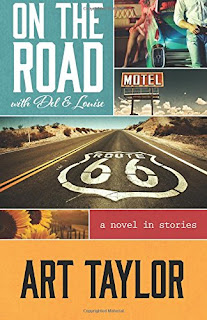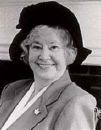An Interview with TWO Best American Mystery Story Authors
story writers always rejoice in any publication of their work, but to be included
in Otto Penzler’s Best American Mystery
Stories (this year selected by Elizabeth George) is a special honor and
distinction. I was thrilled and delighted to hear two good friends and
excellent authors had received that distinction. Art Taylor’s “Rearview Mirror”
was the first adventure in his novel told in short stories On the Road with Deal and Louise (Henery Press). Georgia Ruth’s “On
the Mountaintop” was the first tale in the third Sisters in Crime Guppy Chapter
anthology, Fish or Cut Bait (Wildside
Press). Thanks to them both for telling us about themselves, their work, and
this extraordinary shared experience.—Paula Gail Benson
did you learn that your story would be included in the anthology?
 |
| Art Taylor |
from Virginia to North Carolina for an event at N.C. State University, and I’d
stopped for a quick lunch at a Chick-Fil-A—so, of course, was scrolling through
email. When I saw one with Best American
Mystery Stories in the subject line, I did a double-take, and then had to
read it several times before I believed it was real! I sent my wife a text
message with about a dozen exclamation points in it—and needless to say, I won’t
pass that Chick-Fil-A again without fond memories. It was a great day all
around, and the event that evening at N.C. State was much fun too; having
graduated from there with a master’s degree in creative writing, I’d been in
the audience for their reading series many times before—and such a thrill
to be on the other side of the podium this time and to chat with the current
students about their work.
 |
| Georgia Ruth |
recovering from surgery. I was checking email and saw a message from an
unfamiliar name and almost deleted it before I noticed the subject was Best American Mystery Stories. I held my
breath and clicked. And screamed, disturbing my daughter’s nap. She kept asking
“What’s wrong?” but I was speed reading and stuttering. When I gained control
of my tongue, I read the letter to her twice, and cautiously whispered, “This
is huge.” She texted her siblings, while I went into denial. For two days, I
expected a hook from the wings to jerk me off stage, or a second letter
advising me of a mistake, or a request for money and my social security number.
Then I read in an online group where I lurk that talented Art Taylor and Rob
Lopresti had also received this letter sent out to twenty writers. That’s when
I celebrated!
us about your story and what compelled you to write it.
was originally written as a dare—my wife Tara Laskowski, who’s also a
writer, challenging each of us to write a story for a fiction contest hosted by
the Washington Post. The contest used a photograph as a prompt, and a
description of that photograph is basically embedded in the 12th paragraph of
the story, and then I also drew on a trip to New Mexico that Tara and
I had taken the year before, so there were a couple of factors that spurred me
on and influenced the shape of the story…though I have to stress that Tara and
I got along much better than Del and Louise, and neither of us committed any
crimes during our time in the Southwest!
same daughter’s deployment to Iraq that put into motion my thoughts for this
speculative story, “The Mountain Top.” I kept her two sons, and I also kept my
job selling diamond engagement rings. She returned safely to continue a
traditional American lifestyle, but mine was permanently askew. With the
bailout of Freddie Mac and Fannie Mae, the skyrocketing national debt, and
rumors that social security could no longer be funded, I was fearful for the
future. When I retired to a log cabin in the North Carolina foothills, my
characters came to life. Their story is about fear and greed, handled with
a fierce devotion to family.
do you write short stories?
subscribed to Ellery Queen’s Mystery Magazine when I was about 10 years
old or so, I’ve loved the form of the short story—and particularly the mystery
short story—and because the short story is at the core of the workshop-model
that drove the creative writing programs where I studied, I’ve devoted more
time and attention to honing my craft in that direction. On the Road with
Del & Louise is a hybrid of sorts—a novel in stories that at once
capitalizes on the pleasures of the short story (and on what I hope are
the strengths I’ve developed as a short story writer) but also builds
those stories together into a longer story, an overarching narrative, in which
the whole is ultimately greater even than the sum of those parts. That was my
goal, and the fear has been that it would fail on both counts—working
neither way. With those fears in mind, it’s been a joy this month to have the
overall book named a finalist for the Agatha Award for Best First Novel and to
have this individual story as published in the book singled out as one of the
best short stories of the year—dreams come true in each case, absolutely.
stories of all lengths, and I have seven shorts published. If I can express
my theme in 5000 words, I am thrilled but often I have to write the story
to identify the theme, a whydunit rather than whodunit. I have a short
story of 15,000 words that I submitted for publication. In my heart, I
know it deserves a more satisfying ending. Three years ago I awoke with a
vision for a historical suspense story of 10,000 words, but it was not
completed until recently. Now it has 89,000 words. The story itself
determines the stopping point. My goal is to layer each story with
subplots that will generate discussion among characters and readers. When
I mumbled “This is huge,” I was referring to the honor that my story was
chosen by one of my favorite authors, Elizabeth George. She is the queen
of psychological suspense.
Art and Georgia! Looking forward to reading your wonderful stories in a new
venue!



